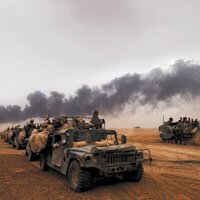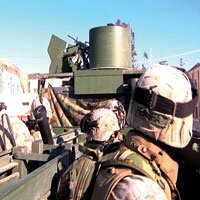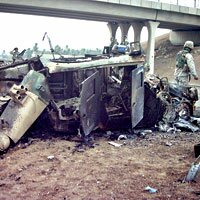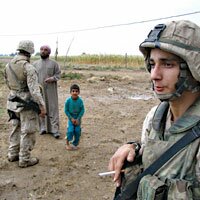Maxim Interview
Pat Dollard traded a life of luxury as a Hollywood agent for that of a war journalist dodging bullets and shrapnel alongside the Marines in Iraq. He did it so you could see the truth…his version of the truth.
Maxim, November 2006

Eventually, I learned the joys of killing. But I’m skipping ahead of myself. I landed for my first stint in Iraq in November 2004 armed with a video camera instead of a weapon. I had obtained a rare embed from the United States Marines Corps for a nonjournalist private citizen to make my documentary, Young Americans.
I had some help pulling strings—the Corps doesn’t like journalistically unaccredited Hollywood talent agents having unfettered access on the front lines of the war on terror. This story will seem a little sketchy and broad-stroked—because I’m stoned and I’m a liar. The former actually isn’t true. But while I can’t give away all the details of my film, I am, however, going to take you into parts of Iraq you hear about but won’t see on prime time. CNN correspondents tend to send dispatches via satellite videophone from the relative comfort of fortified bases, the smoke from recent explosions pluming in the background. Me? I took my camera and went out on patrol with the men of the U.S. Marines. I was in the explosions.

First Stop: The Triangle of Death
I thought I was going to the place I knew from the news, a place where combat meant an occasional “roadside bomb” (a.k.a. an IED) exploding. The notion of a 24/7 engagement never entered my mind. That misconception ended the first night I arrived in Camp Kalsu, 25 miles south of Baghdad, outside Iskandariyah, in an area commonly referred to as the Triangle of Death—and my new home for the next three months. I was shown my hootch (tent) and given directions to a jury-rigged phone and Internet tent where everyone was allowed 20 minutes a session. “Careful, though,” said public affairs chief Staff Sgt. Demetrio Espinosa. “That phone tent was hit by a mortar last night, and we had 18 casualties.” When I got there the tent was a standing imitation of a hunk of Swiss cheese. On the way back to my hootch, I saw several others blown to shit. Goodnight, Iraq, nice to meet you.
In my former life I was Oscar-winning director Steven Soderbergh’s agent and manager. I co-owned a prosperous talent management firm, Relativity Management, lived in a four-story mansion, and somehow successfully stumbled (often drunk and stoned) through the whorehouse called Hollywood. I was an indoctrinated hardcore liberal. If you think I’m a spoiled dick and you hate me, then we’re on the right track. But having a child 10 years ago changed my thinking. It gave me a certain respect for capitalism and even corporate America.
When I bought a new Hummer H2 back in 2002, I ordered a custom license plate that read U.S. WINS. I got it because I believed in the message. I wanted people to have a reaction to the plate, usually negative, and then examine their thinking. Would it be so bad to win this war? Plus, I knew it would fucking piss everyone in the city off because it was Los Angeles.
I could give two fucks about WMDs. There were much more important reasons to topple Saddam—terrorism being one of them. The root causes of terrorism are the lack of capitalism, the lack of democracy, and the lack of modern education. What has stood in the way of those things has primarily been the regimes of Iraq, Iran, and Syria. We just got one of them out of the way.
Before my first trip to Camp Kalsu, I was just another guy sitting on his couch who felt like he was getting a very biased perspective from the news. I wanted to find out firsthand what was happening in the Middle East. This story, and my documentary, revolves around three things: the daily lives of the marines, the larger political context of the war, and the story of an average American citizen that had no business there but wanted to learn what the fuck was going on. I’d used a video camera five times in my life before going there. I have no military background or training whatsoever. Other than having been the glorified executive producer from time to time, which is just being a guy in the office and occasionally being on set, I knew nothing technically about filmmaking. The only city in Iraq I could point to on a map was Baghdad. I knew jack fucking shit. And today even I can’t believe I’m still alive.

Rolling With the Suicide Squad
Dressed in civvies and running around with a video camera, I stuck out. And the soldiers of the 1st Battalion, 2nd Marines had far more important matters on their minds than entertaining outsiders. One of my first interviews, a Cpl. Gilbert Jensen, summed it up: “Don’t talk to me. I have nothing good to say.” Still, they let me tag along. When I wasn’t filming a patrol in the Triangle from the back of a Humvee, I went along on IED-hunting missions with the Suicide Squad in a convoy of LAV-25s. That’s short for light armored vehicle, but the marines just called them pigs.
The back of a pig, basically a small eight-wheeled tank, is unbelievably claustrophobic and uncomfortable. You have to sit in that one spot, over and over and over, and you’re cramped in there with six marines. It fucks with the mind. Like I said, the pigs are used primarily to find and clear the roads of IEDs, which they usually find by rolling over them and getting blown up.
The fear of random explosions was perfectly relentless. We all imagined things like being covered in diesel, burning, screaming from shrapnel sticking out of our eyes. The fact that I often sat over the fuel tank and one of the corporals referred to me as “the cooked chicken” only further fried my brain. I thought of my dick. I thought about the types of rounds and shrapnel that could pierce the pig’s skin. I cataloged every bolt and bullet in my vicinity just to understand what would pierce my body should bad luck and ballistics conspire against me. These are the thoughts of the average marine’s and this civilian’s mind when out on the roads of Iraq. This was a war with no lulls; it just kept going and, therefore, eating at the mind. As one anonymous marine put it, “When I get home I’m going to be just like a dog who was locked in a small cage and constantly stabbed with a sharp stick.” There are a lot of guys who will come back feeling the same way, and they might never change.
Subconsciously, I needed to get blown up to feel like an equal. It finally happened outside a small, nameless village in the Triangle while on a Humvee patrol. A small IED exploded, leaving me stunned, but the vehicle didn’t take much damage—just a flat tire and a light shower of shrapnel. But IEDs, as Sgt. Brandon Welsh, one of the main subjects in Young Americans, can attest, vary in size. Welsh found the mother of all IEDs in a field when he discovered a jury-rigged 500-pound airplane bomb. Luckily for Welsh, the triggerman had left his post, probably scared off by one of the pigs. Welsh could only laugh after the Explosive Ordinance Division came out and blew the sucker, “Did you see the size of that fucking thing?”
I narrowly missed dying in one of the most catastrophic accidents since America invaded Iraq. During one of my forays out of the Triangle, I met members of the 1/3 headquartered in Camp Fallujah. Two marines, 1st Lt. Dustin Shumney and 1st Lt. Travis Fuller, asked me to ride along on a mission to the Syrian border. I wanted to think it was because they liked me. But it was because I’ve got the fucking camera. At the last minute I pulled Fuller to the side and said, “Look, dude, should I go on this mission? Are you guys going to be doing something exciting, or are you just going to be checking fucking driver’s licenses coming from Syria?” After already asking me 100 times to go, he said, “Pat, to be really honest with you, that’s probably all we’re going to do. You should probably go back.” On January 26, 2005, Fuller and Shumney died alongside 28 other marines and one sailor when their CH-53E Super Stallion transport chopper went down in a sandstorm, 220 miles west of Baghdad.
Incredibly, in March 2005, I left my first stint unscathed. As the marines of 1/2 cycled out of Iraq, I planned a visit stateside before returning to Iraq and, more importantly, Ramadi. “Don’t go to Ramadi, man—you’re still alive,” one of the marines, Lance Cpl. Charles Molinare, told me. “You’ve made it this far. Get on the pig with us. We’re going to Kuwait. It’s all going to be good. You’ve shot enough shit to win an Oscar.” The only things going on in Baghdad were car bombs and IEDs. The last place where there was daily, full-on fucking action was in Ramadi. That’s why I went there.

Welcome to Ramadi
When I arrived in Ramadi in November 2005, it was clear that Satan had punched a hole in the Earth’s surface, plopped down his throne, and set up shop. IED craters vastly outnumbered traffic signs. Giant chunks of twisted concrete and metal seemed to literally grow out of the ground everywhere you looked. The whole place looked like Frank Lloyd Wright had been given an unlimited supply of cash and meth. I had requested a posting at Camp Hurricane Point, the Marines’ forward operating base, located at the westernmost tip of Ramadi on the bank of the Euphrates River.
I asked the corporal signing me into Camp Hurricane Point the same question I used whenever I went to a new combat outpost: “How often do y’all get mortared?”
“Three or four times a week,” he replied. “All our roofs are tin.” He was wrong. The mortars came every day.
Not to say that the marines patrolling Ramadi didn’t give as good as they got. They blasted the shit out of everything in sight. The amount of firefights staggered my mind. Daily life consisted of running patrols in Humvees or on foot, hunting insurgents, raiding suspected IED workshops, and dodging sniper fire. On my first night back in Iraq, I rode along for Operation Shank, a sweeping raid of southern Ramadi with the express goal of killing Al Qaeda terrorists linked to Abu Musab al-Zarqawi. As I filmed from the back of a Humvee, I said to myself, “Thirty-six hours ago I was in Beverly fucking Hills.”
After roughly six months spent in Iraqi hot spots, my number finally came up on February 18, 2006. As I rode along packed into the back left seat of the lead Humvee a little before midnight, insurgents ambushed the fourth vehicle in our convoy. The Humvees came to a halt while the marines tried to assess casualties and kill every enemy in sight. Cpl. Matthew Conley, riding shotgun in my Humvee could not raise the marines taking fire on the radio, so he got out of our vehicle to join the battle. As he stepped away, an insurgent on a rooftop above triggered a massive IED buried beneath the street. Conley died instantly. The concussion mortally wounded 2nd Lt. Almar Fitzgerald, the marine sitting six inches away from me in the backseat. I was thrown 30 feet out of the vehicle, my camera recording every second. As small-arms fire popped and RPGs came shrieking in, the marines laid down a deadly hail of lead. I crawled back to the Humvee, picking up my camera along the way. The firefight lasted an hour before our attackers fled or died. The marines stormed the house where the insurgents had lain in wait for us. On the roof I stood in the very spot from which a man had detonated the bomb that killed Conley and Fitzgerald and left my legs filled with shrapnel.
As physically fucked up as Ramadi had become, something very different was happening psychologically. The people were over the insurgency. The rest of Iraq was moving on, and the terrorists knew it. After the invasion, the vast majority of Iraq embraced the obviously positive change that fate had brought to the land. Ramadi, however, always belligerent, full of a history of rebelling against any outside authority and full of Sunni Baathists who had it made in the shade under Saddam, went gunning for the coalition and the new government from day one. The marines set up an anonymous tip line, and the calls flooded in. They got so much intel, busted so many insurgents, dug up so many weapons caches, that the insurgents freaked out and blew up the phone lines from Ramadi to the Syrian border. The sheiks, the local leaders who once supported the insurgency, finally engaged in talks with us and gave the nod for the population to start cooperating. The police department began recruiting new members. An Al Qaeda suicide bomber blew up the first 100 recruits in line. I was there. It was hell. When I left Iraq last April, Ramadi was the last great holdout in Iraq. Today it remains the last stronghold of the terrorists. Once the war ends in Ramadi, the war will end in Iraq.

Coming Home
Making this movie cost me everything. I am a virtual outcast in Hollywood. After photos from a haircut party at Camp Iskandariyah made it back to the States, there were pictures of me with a new Mohawk and die shaved in my chest, and rumors swelled that I had finally snapped and turned into Travis Bickle, De Niro’s character in Taxi Driver. No one in L.A. understood what men in a combat zone would do to break the monotony, to create a chance to laugh. My family will barely speak to me anymore because they lean so far to the left. My soon-to-be fourth ex-wife and I are in a legal battle over visitation rights for our daughter. I know I can’t take care of my kid; I’m going back to Ramadi as soon as possible. It’s terrifying to go there. There’s a 10 percent chance you’re going to die, there’s a 30 percent chance you’re going to be wounded, and there’s a 100 percent chance that hot metal will go flying near your body.
The average marine was proud to be there doing his job. I have tape after tape of marines telling their liberal “rescuers” to go fuck themselves. They knew what they were doing there, that they were keeping Iraq from turning into a terrorist state that would have made Afghanistan under the Taliban look like Disneyland.
I’m not going into all the details. In fact, I’m barely scratching the surface. I made a documentary series for a reason. You can get some flavor at patdollard.com. Suffice it to say that many of my friends died, that I was wounded badly, blown up, and thrown out of vehicles. It’s all on tape. Getting at the root of terror is clear: topple these regimes and then bring democracy, capitalism, and education to the Islamic world. Let them have the hot wife, the Bimmer, and kids to live for. America has to lift them up, not because we are a country of great guys, but to keep them from growing into lost killer boys with the U.S. in their sights.
I’ll be back among the Marines in Ramadi before year’s end. Semper fi.

